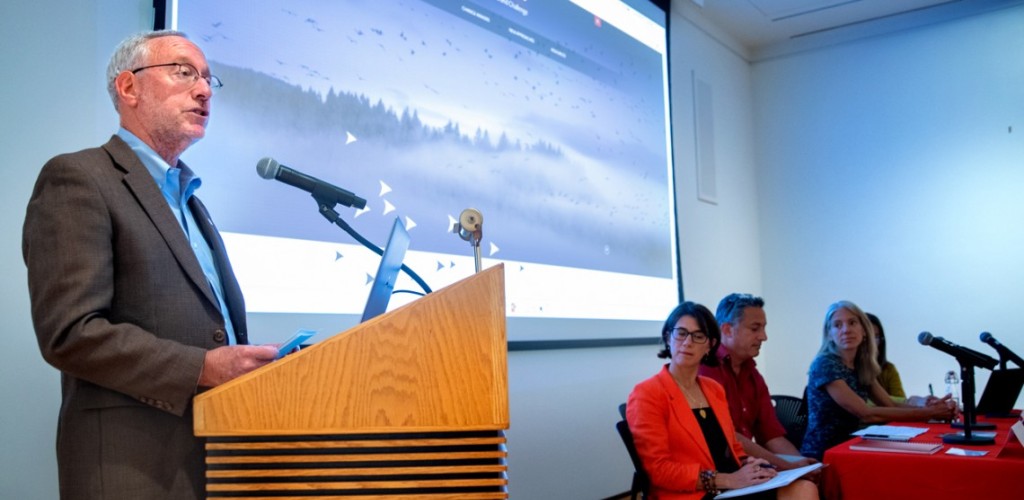The new initiative – Migrations: Researching, Teaching and Building for a World on the Move – was officially launched Oct. 1 with a panel discussion and interactive tour of a special exhibit on migration, how the light gets in, at the Herbert F. Johnson Museum of Art.
Cornell’s inaugural Global Grand Challenge grew out of a symposium held last November and a subsequent task force of 16 faculty members, representing nine colleges and schools, who identified focal areas and activities of interest.
The topic of migrations is both timely and in keeping with the university’s mission and values, according to Provost Michael Kotlikoff.
“From our founding more than 150 years ago as the land-grant university of New York state, all the way to the present, our mission has always included bringing knowledge to bear for public benefit, and to meet the world’s major challenges,” Kotlikoff said. “Perhaps no issue today is more pressing and more complex than the movement of humans, plants, animals and resources across a planet that is increasingly fragile – environmentally, economically and socio-politically.”
The initiative draws on academic expertise from across the university to explore the myriad types of migration from multiple perspectives. Nearly every college and unit at Cornell has work that touches on migration in some way, from animal and plant science, to law and labor, to history and the arts, said Wendy Wolford, vice provost for international affairs.
“This is a huge topic, as a grand challenge should be,” she said. “And it’s not always an easy topic. There are significant political implications to how you talk about migration and migrants.”
Wolford cited her own work in the Galapagos Islands as an example.
“You may think that blackberry is relatively uncontroversial, but once you name it an invasive species, then farmers start setting trucks on fire,” Wolford said. “The way we label things, the way we think about who belongs and what belongs and who doesn’t and why, and how we govern those, how we police those, is incredibly important. … The fact that migration is a heated, complicated, politically sensitive topic is why we should work on it, and why we should work on it together.”
The panel discussion featured task force co-chairs Shannon Gleeson, associate professor of labor relations, law and history; Amanda Rodewald, the Garvin Professor in the Department of Natural Resources and senior director of conservation science at the Lab of Ornithology; and Eric Tagliacozzo, professor of history. The co-chairs discussed how their own research and disciplines address various forms of migration.
Tagliacozzo recounted the historical migrations of people across “the hinge” of Southeast Asia, as well as the movement of unexpected items, like bananas and xylophones and DNA. Then there were the more sinister migrations, such as colonialism and diseases like smallpox.
“In the 19th century, people were often moving from rich countries to comparatively more marginal ones, and that includes people coming from Europe to what we now think of as the United States. … But in the 20th century, there was a reversal of the processes,” Tagliacozzo said. “Now most people are in motion from the poorer parts of the planet to the wealthy parts of the world. And we can think about this, especially with the ongoing crisis of migration that is happening in the Mediterranean, the so-called soft underbelly of Europe.”
Gleeson described the initiative as an opportunity to not only work across disciplines, but to also look inward at these fields and reshape the study of migration, specifically its causes, continuities and impacts.
“Immigration as a field and as a phenomenon is not occurring in isolation,” she said, “and so I’d also encourage us to reach beyond the field of migration studies, to think about, for example, the insights of carceral studies, and how to think about the increasing immigration apparatus as being another manifestation of state terror.”
Rodewald noted that while it is common to connect the topic of migration to humans, there are many other living organisms and nonliving objects moving across the planet.
“Migratory birds connect us across counties, countries and continents,” she said. “They also they provide a useful lens to understand the complex socio-economic, political and ecological dynamics that play out over various spatial, temporal and hierarchical scales.”
She pointed to recent Lab of Ornithology research that showed the loss of nearly one-third of North American birds since 1970.
Wolford said the initiative’s goals are threefold: to expand and deepen Cornell research, teaching and engagement on migration; to build collaborations between students and faculty from across the university; and to influence policy and provide leadership on issues related to migration.
To that end, the university will launch a seminar series that highlights the migration research of faculty members and creates interdisciplinary synergies. And on Oct. 15, the university will issue calls for individual research projects, interdisciplinary team projects, workshop and seminar funding, and projects for undergraduates to work with community partners with support from the Office of Engagement Initiatives. In addition, the Einaudi Center for International Studies will be searching for postdoctoral fellows and faculty fellows to be involved in the initiative.





